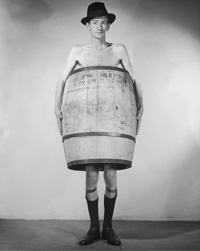 The ownership rights to live athletic events has been the subject of much legal controversy since the rise of commercialized spectator sports a century and a half ago. In 1885, the Detroit Wolverines baseball club, then a member of the National League, sued John Deppert ,who owned a barn adjacent to Recreation Field, where the team played. Deppert was charging baseball fans a fee to climb on to the roof of his barn, from which the Wolverine games could be watched. A half-century later, the issue shifted to radio broadcasting, and the question became whether or not a radio station could broadcast live accounts of an ongoing game without the permission of the home team.
The ownership rights to live athletic events has been the subject of much legal controversy since the rise of commercialized spectator sports a century and a half ago. In 1885, the Detroit Wolverines baseball club, then a member of the National League, sued John Deppert ,who owned a barn adjacent to Recreation Field, where the team played. Deppert was charging baseball fans a fee to climb on to the roof of his barn, from which the Wolverine games could be watched. A half-century later, the issue shifted to radio broadcasting, and the question became whether or not a radio station could broadcast live accounts of an ongoing game without the permission of the home team.
Today’s version of the question involves streaming images of games across the Internet. Earlier this month, Wisconsin federal district court judge William Conley weighed in on this question. The ruling came in a case involving the Wisconsin Interscholastic Athletic Association and The Appleton Post-Crescent newspaper and the Wisconsin Newspaper Association.
The WIAA sued The Post-Crescent after it streamed live coverage of four high school football playoff games in 2008.
The paper was apparently lawfully on the premises from which it “broadcast” the games, and it does not appear to have violated the terms of any license acquired from the WIAA.
In 2004, the WIAA had entered into a exclusive agreement with the When We Were Young Internet broadcasting firm that granted the company the exclusive right to stream live WIAA football games across the Internet. In the lawsuit, the WIAA took the position that it “owned” the rights to the games it produced, and thus could exclude the Post Crescent from broadcasting the games in competition with the official licensed broadcaster. The newspaper defended on the grounds that the exclusive agreement ran afoul of the First Amendment and the Fourteenth Amendment’s Equal Protection Clause.
In his opinion, Judge Conley ruled on behalf of the WIAA, essentially finding that the association “owned” the rights to its games and that its granting a monopoly streaming license to one entity did not offend First Amendment values. Although John Deppert won his case back in 1886, twentieth- and twenty-first-century decisions in the United States have tended, with a few exceptions, to favor the party that puts on the athletic events, although the precise legal rationale for so finding has varied from case to case.
The issue is also not exclusively an American one, and the resolution of these disputes in the courts of other nation’s has not been uniform. An Israeli court recently reached a decision contrary to the Wisconsin decision in a case involving the streaming of English Premier League soccer matches to Israel, via the Internet. The court ruled that the league and its teams had no ownership interest in the games themselves, and thus could not prevent the dissemination of the games in Israel.
There is no question that the party who controls the grounds on which the games are played can impose restrictions on those who enter as licensees. However, whether or not there should be an additional property right in the games themselves is a question on which there appears to be no greater consensus today than there was in Deppert’s time.
 Summer is here and, much to my joy, videos are back! The confluence of Lady Gaga, Glee, OK GO, and You-Tube has reminded us of the great art form of the 1980s, the video, a four- to five-minute presentation of a lip-synched musical song in which dance-choreography was more often than not a crucial element. The video had elements of a copyrighted work (under Section 102 of the Copyright Act, it can comfortably be classified as audiovisual work), but more importantly than that, the video served as an extended commercial to prompt the viewer to go out and purchase the artist’s work.
Summer is here and, much to my joy, videos are back! The confluence of Lady Gaga, Glee, OK GO, and You-Tube has reminded us of the great art form of the 1980s, the video, a four- to five-minute presentation of a lip-synched musical song in which dance-choreography was more often than not a crucial element. The video had elements of a copyrighted work (under Section 102 of the Copyright Act, it can comfortably be classified as audiovisual work), but more importantly than that, the video served as an extended commercial to prompt the viewer to go out and purchase the artist’s work.

